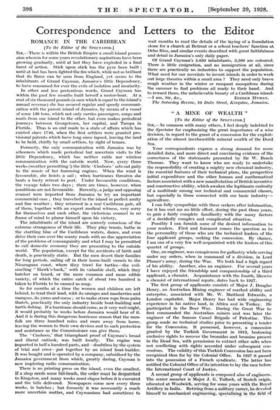Correspondence and Letters to the Editor ROMANCE IN THE CARIBBEAN
[To the Editor of the SPECTATOR.] SIR,—There is within the British Empire a small island posses- sion wherein for some years revolutionary aspirations have been growing gradually, until at last they have exploded in a final burst of action. Stick upon stick has the pyre been built ; until at lait has been lighted the fire which, while not so brilliant that its flame can be seen from England, yet seems to the inhabitants of Grand Cayman, Jamaica's little Dependency, to have consumed for ever the evils of isolation and insularity.
In other and less pretentious words, Grand Cayman has within the past few months built herself a motor-boat. At a cost of six thousand pounds (a sum which is equal to the island's annual revenue) she has secured regular and speedy communi- cation with the parent island of Jamaica, by means of a vessel of some 130 tons, which not only carries passengers, cargo and mails from one island to the other, but even makes periodical journeys between Georgetown, her capital, and Tampa in Florida. Thus is an end made to a state of affairs which has existed since 1740, when the first settlers were granted pro- visional patents which have long since lapsed, leaving the land to be held, chiefly by small settlers, by right of tenure.
Formerly, the only communication with Jamaica was by. schooners which made periodical but uncertain visits to the little Dependency, which has neither cable nor wireless communication with the outside world. Now, every three weeks (weather permitting !) the little Cimboco ' sets out gaily to the music of her humming engines. When the wind is favourable, she hoists a sail ; when hurricanes threaten she beats a hasty retreat to port. Under favourable conditions, the voyage takes two days ; there are times, however, when conditions are not favourable. Recently, a judge and opposing counsel were imported from Jamaica to try an important commercial case ; they travelled to the island in perfect amity and fine weather ; they returned in a real Caribbean gale, all of them, together with an expert medical witness, very sorry for themselves and each other, the victorious counsel in no frame of mind to plume himself upon his victory.
The inhabitants of the island are scarcely conscious of the extreme strangeness of their life. They play tennis, bathe in the startling blue of the Caribbean waters, dance, and even drive their cars over the scanty roads with no due appreciation of the problems of consanguinity and what I may be permitted to call domestic economy they are presenting to the outside world. The population, except for the,accidents of birth and death, is practically static. But the men desert their families for long periods, sailing off in their home-built vessels to the Nicaraguan coast, where they trawl for turtles—the evil- smelling " Hawk's-back," with its valuable shell, which they butcher on board, or the more common and more edible variety, of which the entire catch of about two hundred is taken to Florida to be canned as soup.
So for months at a time the women and children are left behind, to tend their land, with its oranges and naseberries and mangoes, its yams and cocos ; or to make straw rope from palm thatch, practically the only industry beside boat-building and turtle-fishing. If a hurricane should come, as it very well might, it would probably be weeks before Jamaica would hear of it. And it is during this dangerous hurricane season that the men- folk are three hundred miles and more away from home, leaving the women to their own devices and to such protection and assistance as the Commissioner can give them.
The Cimlboca,' that triumphant proof of Cayman's broad and liberal outlook, was built locally. The engine was imported in half a hundred parti, and—doubtless by the system of trial and error—put together by an island boat-builder. It was bought and is operated by a company, subsidised by the Jamaica government from which, greatly daring, Cayman is now imploring radio communication.
There is no printing press on the island, even the smallest.
If a shop needs some bill-heads, the order must be despatched
to Kingston, and many weeks must elapse before it is executed and the bills delivered. Newspapers come now every three weeks, in batches ; but formerly it was necessarily a much more uncertain matter, and Caymanian had sometimes to wait months to read the details of the laying of a foundation stone for a church at Retreat or a school teachers' function at Ocho Rios, and similar events described with great faithfulness and detail in Jamaica's only daily paper.
Of Grand Cayman's 5,650 inhabitants, 3,560 are coloured. There is little emigration, and no immigration at all, since there are practically no industries to support the population. What need for our novelists to invent islands in order to work out large theories within a small area ? They need only brave rough weather in the winter or rampant mosquitoes during the summer to find problems all ready to their hand. And to reward them, the unbelievable beauty of a Caribbean island.
—I am, Sir, &c., ESTHER HYMAN. - The Saturday Review, 10 Duke Street, Kingston, Jamaica.




































 Previous page
Previous page